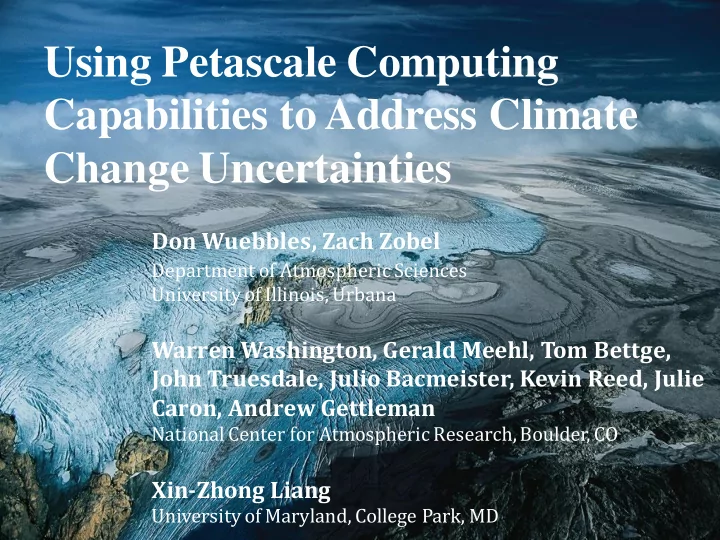

Using Petascale Computing Capabilities to Address Climate Change Uncertainties Don Wuebbles, Zach Zobel Department of Atmospheric Sciences University of Illinois, Urbana Warren Washington, Gerald Meehl, Tom Bettge, John Truesdale, Julio Bacmeister, Kevin Reed, Julie Caron, Andrew Gettleman National Center for Atmospheric Research, Boulder, CO Xin-Zhong Liang University of Maryland, College Park, MD
The Key Challenge Global climate change is one of the most important issues of the 21 st Century. Our project is aimed at using Blue Waters to address key uncertainties in the numerical modeling of climate change occurring now and into the future. High resolution global and regional climate modeling studies that allow for new scientific understanding of climate change and resulting impacts. Sensitivity analyses to improve understanding of specific climate processes and interactions.
Uniqueness of Using Blue Waters High-resolution Spectral Element (SE) dynamical core development , tuning, and testing Time-slice runs for 1979-2010 AMIP study at 0.25 ° (~25 km) resolution, and then for 2070- 2100 using high RCP8.5 scenario. UIUC/NCAR project with NSF using CESM1 at 0.25 ° (~25 km) resolution with 1 ° ocean 150+ years in past and 100 years future Multiple realizations (scenarios) High resolution WRF regional modeling studies Sensitivity analyses aimed at understanding radiative-cloud-aerosol interactions
Why Blue Waters? The science being done in this project would not be possible without Blue Waters. The advanced dynamical model cores used in CESM high resolution studies require petascale. The high resolution regional climate studies are possible because of Blue Waters. Similarly the unique super-ensemble approach used in the climate sensitivity studies need petascale. Next generation Track-1 capabilities would allow us to further advance the study of the Earth’s climate system
CESM: Bias Corrected Future SSTs and CO 2 2070-2099: Projected large warming in oceans CO2 Mixing Ratio 799 ppmv 361 ppmv
2070-2099: Ens1 2070-2099: Ens2 Track Density: Nearly 2x projected decrease in N Atlantic! CESM 1979-2010 Observed: 1979-2010
Track Density: Increase in Cat 4+ relative to today
PDFs: Total Storm Precipitation Future Present
CESM: Particles Affect Tropical Storms From Kevin Reed BAM = B ulk A erosol M odel (prescribed) MAM= M ulti-modal A erosol M odel (interactive) MAM may reduce N. Atlantic activity by up to 50% BAM-MAM
Multi-Century Analyses of CESM Being Run Are Unprecedented 12-km CAM-SE Run • Fully couple configuration • 25km CAM5-SE • 1-degree ocean • Multi-century integration • 1850-2100 • Currently Running on Blue Waters Enhanced understanding of climate change, e.g., severe weather and regional effects
High Resolution Studies with WRF Use WRF to downscale global climate models (GCM) in order to observe smaller scale features that would have been lost in the fine scales of a GCM. Image shows that WRF precipitation using spectral nudging compares well with N. American Reanalysis data.
Examining Future Decades WRF run with boundary conditions from multiple GCMs, get better understanding CCSM4 of climate effects over GFDL WRF WRF N. America. For WRF using 2 different GCMS, shown are changes in monthly precipitation for 2085- 2094 compared to the historical decade of 1995-2004.
CWRF/CAR Experiments We have defined 25 CWRF/CAR configurations (Liang and Zhang 2013) and are doing the ensemble runs for 1979-2012 as driven by ERI reanalysis to determine the model structural (physics) uncertainty effect on regional climate hindcast of the observed climate characteristics over North America. We are preparing to run the same set of the select CWRF/CAR ensemble but driven by CCSM4 simulations in CMIP5 for 1950-2005 and future 2006-2060 under RCP4.5 and RCP8.5 to evaluate the effect of the model structural uncertainty and the range of future climate change projections at regional scales. This structural uncertainty range is anticipated to be significant and serve as a proxy for the regional response to the potential global CESM climate sensitivity.
Cloud-Aerosol-Radiation Ensemble Model cst ( 3) ccs ( 4) cover types ccb ( 5) (360) (13) cci ( 2) bin ( 3) rel ( 6) radius rei ( 7) vertical (42) bgd (1) rer ( 1) Cloud Aerosol Aerosol profiles sul (2) (10 6 ) liquid ( 7) (8) ssa (2) Cloud ice (16) dst (2) water (3) (10 6 ) (10 10 ) (72) rain ( 3) (10 10 ) cab (2) (336) graup ( 1) tot (3) optics snow ( 1) 10 18 liquid ( 4) (1152) bgd (1) optics ice (17) sul (2) (137088) rain ( 2) ssa (2) configurations graup (1) (408) (16) dst (2) indirect snow ( 1) cab (2) effects emis ( 3) ccn (6) (18) mosaic geometry binding ( 3) cloud radius (3) (9) (9) overlap ( 3) Radiation Radiation (10 2 ) earth orbit (10 2 ) C radiative gases surface characteristics infrared solar (9) (10) topographic effect cccma cam fuliou gfdl rrtmg csiro eta rrtmlw gsfclxz cccma cam fuliou gfdl rrtmg csiro eta gsfcsw swrad gsfclxz
Summer Biases in Temperature • Results are strongly sensitive to model physics configuration • Some performs better than others overall, but none capture all observed features • An optimal physics ensemble is needed to represent the plausible range of uncertainty from model structure sensitivity
Summer Precipitation Sensitive to Model Physics Representation �
Conclusions and Products Reed et al., 2015: Impact of the dynamical core on the direct simulation of tropical cyclones in a high – resolution global model. Geophys. Res. Lett., in press . The 1850-2100 runs will likely lead to many new research findings and resulting papers. The WRF studies will likely produce at least two papers this summer. WRF and CWRF studies to result in PhD theses. All outputs to be available to other researchers
Our special thank you to Ryan Mokos and other Blue Waters team members for their help with a variety of issues over the year.
Recommend
More recommend